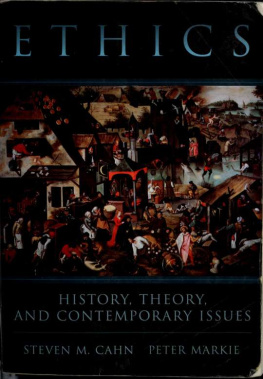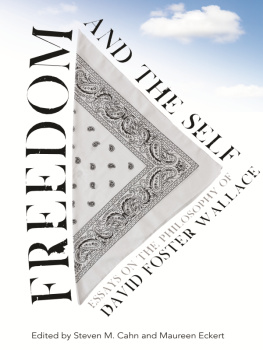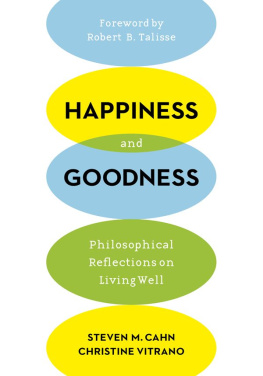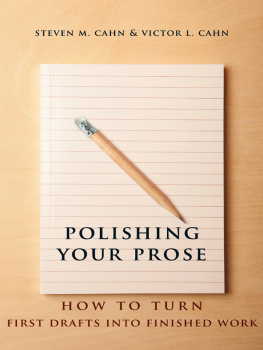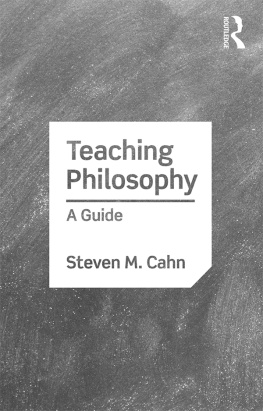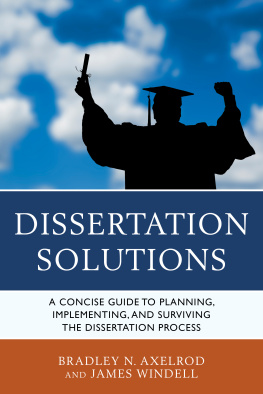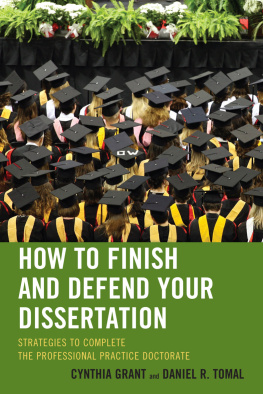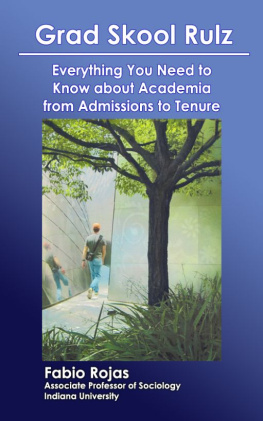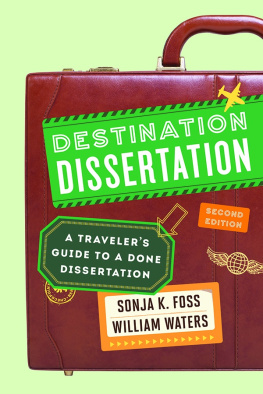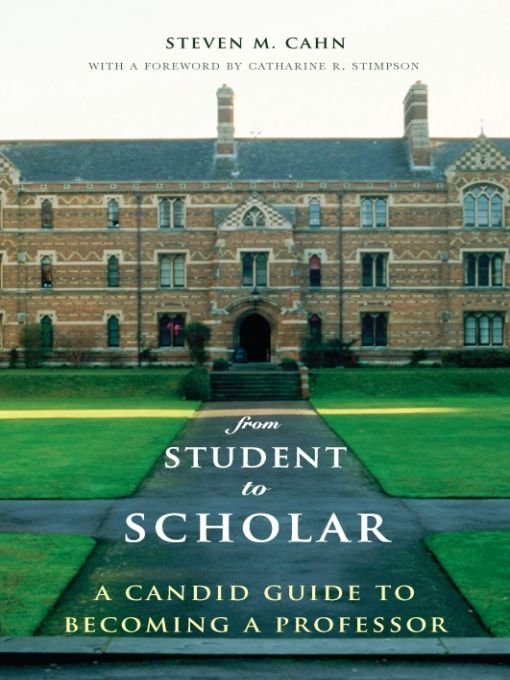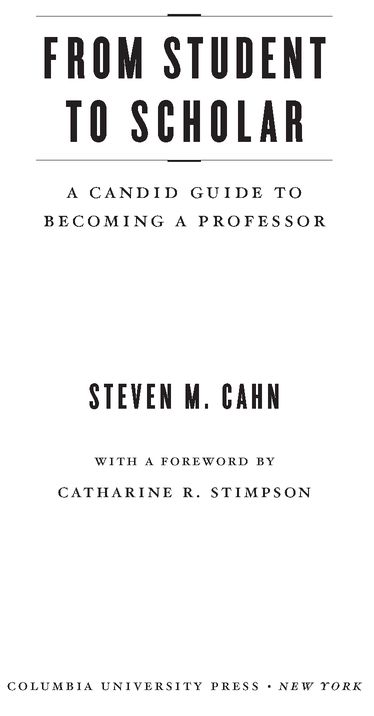Table of Contents
TO MY WIFE, MARILYN ROSS, M.D.
[FOREWORD]
CATHARINE R. STIMPSON
Steven M. Cahn has had a long and distinguished career. Widely published, he is a philosopher and an astute student of education. He has also worked in foundations, the government, and universities in the United States as a leading administrator. Now, in From Student to Scholar: A Candid Guide to Becoming a Professor, he devotes his wisdom and experience to the task of providing a road map for the men and women who want to join an ancient and usually honorable companythat of scholars and teachers. His ideal reader is someone who hopes to enjoy a successful academic career, especially in the arts and sciences, but the map is so clearly wrought that others will learn from it as well.
Cahn begins with graduate school, that indispensable ordeal for nearly every modern scholar and teacher. As David Damrosch writes in We Scholars, To an unprecedented degree... American intellectual life today is shaped by the values and habits of mind inculcated during years of specialized undergraduate and graduate training. It is an illuminating experience for others. For all, it is testing and demanding. Cahn rightly notes how crucial are resiliency and perseverance if a student is to survive and thrive. His advice is equally valuable about the last and highest hurdle of doctoral education: the dissertation. Take a manageable topic, he cautions, and change advisers if necessary. Graduate students need neither a slacker nor a prima donna nor a troublemaker as their paramount mentor.
Cahn then introduces his readers to the academic job market. He refuses to dwell at length on the vicissitudes of the highly competitive contemporary arena: the uneven supply of jobs for new scholars, the decline of tenure-track positions, and the accompanying rise in part-time and contract positions. Many of the graduate students I know look at the job market with pride in their discipline but with great and understandable anxiety about their prospects. Cahns purpose is to provide pragmatic but honorable counsel for managing this difficult terrain. He underscores the importance of belonging to networks, those dynamic systems of connections among people, and of observing rules of etiquette that balance decorum and personal dignity.
A young scholar who is fortunate enough to find a tenure-track job in a college or university must then prepare for the tenure review by balancing good teaching, responsible service, and research and publication. The latter matters most. Especially but not exclusively in research universities, the pressure to publish is intense. As Cahn realistically writes, Without a strong publication record, not only is your tenure in doubt, but so is your ability to move to another school.
As a young, nontenured professor, I violated much of Cahns prudent advice to express your views, lest others consider you uninformed or unconcerned. But be circumspect. Dont engage in personal attacks, dont fight unnecessary battles, and dont aggressively lead a campaign for an idea that is possibly anathema to several tenured members. Perhaps not surprisingly, given my violations, I had a nasty tenure fight, which was ultimately successful because enough people were kind enough to believe in me. Having achieved tenure, I treasure that privilege and blessing as much as Cahn does. As he states, to have tenure is to possess the ultimate job security. He also believes, as I do, that tenure protects academic freedom, and as a result, he argues forcefully for tenure as a bulwark of this essential value.
Although the tone of From Student to Scholar is practical and benignly ironic and wry, the book is at heart an idealistic love letter to the profession of scholar and teacher. its a good life, Cahn concludes. Professors are among the most content of people. We spend our lives working on what we love and sharing our satisfactions for the benefit of others. What more can we ask?
Because Cahns focus is on the career trajectory of a young scholar and teacher, From Student to Scholar strips away much of the historical and institutional context in which such a person exists. Higher education in the United States has become a huge enterprise, comprising more than 4,000 diverse institutions, ranging from community colleges to research universities. As Chris M. Golde points out, the first doctorate in the United States was awarded in 1861. By 1900, a total of about 3,500 had been given. By 2000, more than 40,000 doctoral degrees were produced annually. Increasingly, higher education is thought to be of fundamental social, economic, and cultural importance for national and a personal life. We label ourselves citizens of the Information Age, the Knowledge Society, and the Age of Lifelong Learning. More and more people want not only a baccalaureate but an advanced degree. In 2004, for instance, 75 percent of freshmen in a United States survey said they wanted a masters or a professional degree.
Yet, higher education is riven by internal conflicts and roiled by external critics.
The suspicions about higher education are aimed at many different fronts, among them the structure of the curriculum, the possible waning of the liberal arts, the quality of teaching in the STEM disciplines (science, technology, engineering, mathematics), the rise in tuition and other costs, the nature of the faculty, the increase in bureaucracies, and the power of big sports. The public funding of higher education and research, except at the richest private institutions, is becoming more and more problematic. The young Ph.D. may find him- or herself in a position similar to that of a newly minted civil engineer who wants to assume responsibility for the nations infrastructure. Everyone talks about the importance of sophisticated, reliable highways, bridges, and airports, but too few seem willing to devote public resources to them. Similarly, everyone talks about the importance of higher education, but too few seem willing to fund it.
Moreover, higher education in the United States is confronting much greater global competition. After World War II, U.S. institutions were a primary destination point for international scholars and students, who thought them the world leaders. This prominence is changing for several reasons. One is the greater difficulty in obtaining visas to the United States after September 11, 2001. Another is the energetic policies for recruiting international students in other countries, such as Australia; its international student enrollment jumped from 35,290 in 1994 to 136,252 in 2003. Yet other reasons are the rapid growth of higher education in China and India and the dramatic shift in higher education policies in Europe known as the Bologna Process, which aims to create a unified European Higher Education Area.
In late 2004, because of my long involvement with womens studies, I was reading a publication from Athena, the Advanced Thematic Network in Activities in Womens Studies in Europe. Its theme was the changing nature of womens/gender/feminist studies after the formalization of the Bologna Process on June 19, 1999. As Annex 2, the publication printed the Communiqu of the Conference of Ministers Responsible for Higher Education in Berlin on 19 September 2003, which reviewed the progress toward a coherent and cohesive European Higher Education Area by 2010. I realized that I was not only doing research into European womens studies but also studying deep shifts in European higher education.


